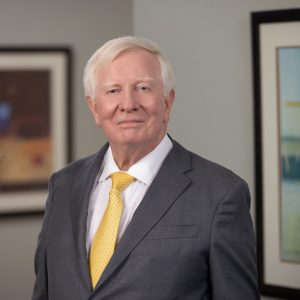CEO Leadership Series: Christopher Cashman, Executive Chairman, Marinus Pharmaceuticals
THE RISKS AND REWARDS OF ENTREPRENEURSHIP
Originally published in Ashton Tweed Connection, February 2012
What are the risks and rewards of entrepreneurship? That’s what we asked Chris Cashman, Executive Chairman of Marinus Pharmaceuticals, Inc. Thanks to his successful entrepreneurial venture as cofounder of Protez Pharmaceuticals, Cashman was the 2008 recipient of the Entrepreneur of the Year Award from the Mid-Atlantic Capital Alliance. In this feature, Cashman shares his entrepreneurial experiences, insights, and inspiration.
A First Step from Big Pharma Towards Entrepreneurship
In 2002, Chris Cashman started a new chapter in his professional career. After 22 years in animal health sales, marketing, business and product development at Pfizer and SmithKline Beecham, Cashman stepped into the role as President and CEO of Message Pharmaceuticals – a small biotech company doing early stage research in drug discovery targeting messenger RNA.
Cashman made this move during what he referred to as the “post-genomic phase” – a time when new discoveries related to genomes, nucleic acid and monoclonal antibodies provided great opportunities in the life sciences industry. But soon after Cashman joined Message, venture capital for pharmaceuticals dried up, and the board decided to sell the company. So Cashman led the company in packing up the intellectual property and products and finding buyers for them. “It was a great learning experience for me,” Cashman describes. “As someone who was new to small biotech, it gave me a rearview mirror perspective of how the company got started, financed and the mistakes along the way.”
As Message was being liquidated, Cashman teamed with two ex-Glaxo SmithKline infectious disease experts and took a big leap into entrepreneurship as they cofounded Protez Pharmaceuticals. Founded in 2003 and sold to Novartis AG in 2008, Protez was focused on the research and development of new antibiotics for difficult-to-treat hospital-based infections – a therapy area big pharma was exiting at that time.
Seizing the Right Opportunity at the Right Time is Key to Entrepreneurial Success
“Being an entrepreneur is like setting yourself out on an expedition,” Cashman observes. “It’s a long journey, so you have to be sure you’re focused on the right opportunity.” Because choosing the right opportunity is key to the success of any entrepreneurial endeavor, Cashman stresses the importance of getting third-party input from external experts from the start. Although it is easy to get excited about an opportunity early on, independent advisors can help provide a more realistic evaluation of the obstacles you’re likely to encounter.
Once you seize the right opportunity, the next step to securing entrepreneurial success is to build a team of people who have the right combination of capabilities to execute your plan. “It is the capability and the commitment of the team that deliver the success,” says Cashman. “Determine what your strengths are,” he advises, “and assemble a team that can fill in the gaps of what you’re lacking.”
The Risks of Entrepreneurship
The risks of entrepreneurship come with the practicalities of execution. You have to be brutally honest not only about your own strengths and weaknesses, but also about the time, money, and resources you’ll need. As you assess the risks and milestones of the plan, it’s easy to get impassioned by the opportunity and underestimate the time and money it will take to be successful. “Then you find yourself between a rock and hard place,” he says. “You must anticipate setbacks and have contingency plans in place – especially in drug development where failure is the norm. You have to be realistic, realize that many things won’t work, and raise enough money so you can fail, regroup, and try again.” Because drug discovery are low probability ventures, he advises, you have to give yourself the time and money to work through failure.
Because of the risks, he adds, entrepreneurs must also be prepared on the home front to weather the early stages of starting a company. “There are no fat paychecks in the early days of the venture,” Cashman cautions, “so you have to be sure your personal expenses can handle it.” Plus, you must be mentally prepared for the long days ahead.
Above all, being an entrepreneur takes persistence and perseverance. Cashman looks to the decade he spent running large divisions at two major pharmaceutical companies as great preparation for being an entrepreneur. In profit-and-loss situations where the organization was expected to hit targets with very little tolerance in the numbers, he learned to successfully deliver on promises. He had to effectively lead and support large teams, while keeping everyone challenged and enthusiastic. “So we’d hit our goals,” he recalls, “briefly celebrate at midnight on New Year’s Eve and start all over again.”
The Rewards of Entrepreneurship
“Entrepreneurship – there’s no substitute for it,” asserts Cashman. That’s because he believes that all people have that element in their hearts to do something with their own hands, their own ideas. And as Cashman looks back, it was the early days of forging the plan that he remembers as the most rewarding. “When success comes, it’s very nice,” Cashman observes, “but it’s the early days – the building part of the enterprise – that are by far the most exciting.”
At the end of the day, it was the passion and the knowledge that the product could make a huge difference in people’s lives that kept Cashman charged up to fight the daily battles. “It’s a roller-coaster ride,” Cashman describes. “There are going to be some failures and dark days. But it’s the internal passion – for me, it’s working with a great group of people attempting to potentially save millions of lives from deadly disease – that sees you through it.”
Ashton Tweed would like to thank Christopher Cashman for this interview. If your company needs help from members of the Ashton Tweed Life Sciences Executive Talent Bank, we can supply that assistance either on an interim or a permanent basis. Additionally, if you are among the many life sciences professionals affected by the changes in the industry, Ashton Tweed can help you find the right placement opportunity — from product discovery through commercialization at leading life sciences companies — including interim executive positions and full-time placements. In either case, please email Ashton Tweed or call us at 610-725-0290. Ashton Tweed is pleased to continue to present insightful articles of interest to the industry.
Christopher M. Cashman
Executive Chairman of Marinus Pharmaceuticals, Inc.
In September 2011, Chris Cashman was appointed Executive Chairman and Director of Marinus Pharmaceuticals, Inc. Prior to Marinus, Chris was President and CEO of Protez Pharmaceuticals, a company he cofounded in 2003. Protez was acquired by Novartis in 2008. Chris was the recipient of the “Entrepreneur of the Year” award by the Mid-Atlantic Capital Alliance in 2008 and the “life sciences CEO of the Year” by the Eastern Pennsylvania Technology Council. Chris has enjoyed a career spanning three decades in the pharmaceutical industry, including prior roles as President and CEO, Message Pharmaceuticals, and as Vice President for both Pfizer and SmithKline Beecham. Chris began his pharmaceutical career at SmithKline Corporation and holds an MS in Economics from Purdue University and BS in Business Management from the University of Minnesota. In addition to Marinus, Chris also serves as Executive Chairman of Rapid Micro Biosystems and on the Board of Directors of Noble Biomaterials, MBF Therapeutics, Mid-Atlantic Diamond Ventures, and the Science Center.





